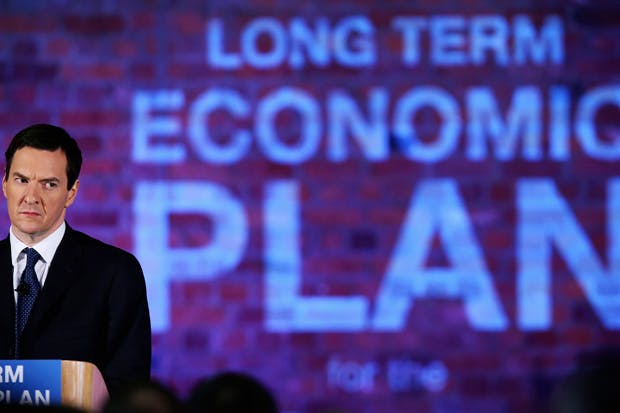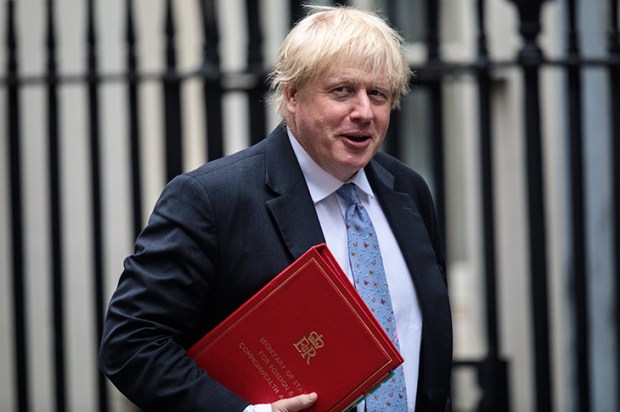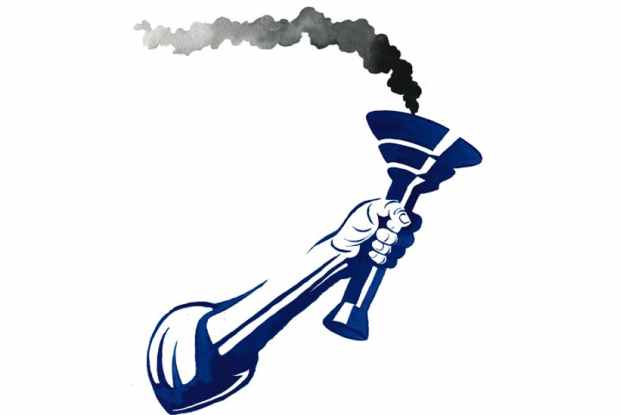These days George Osborne is rarely seen in public without a hard hat and a hi-vis jacket. But he used to take pride in being recognised as a political insider through and through — a member of the guild of politicians, in his own phrase. He revelled in writing detailed articles about the lessons Westminster could learn from American politics.
Several of these were written for The Spectator when Boris Johnson was the editor, which shows how far back the relationship between the Chancellor and the Mayor of London goes. (Osborne was at Oxford as the same time as Johnson’s younger brother Jo, now an MP and the head of the Downing Street policy unit). One of them, written in 2004, set out what Osborne thought were the ‘13 keys to No. 10’. This was based on an academic model for predicting US presidential elections results. Osborne claimed that if any government held six of these keys or more, it would be re-elected.
The first test was: ‘Real per capita economic growth during the parliament equals or exceeds the mean growth during the previous two parliaments.’ The coalition is currently on course to meet this target — just. Between 2001 and 2005, GDP per capita grew by 9.7 per cent. But between 2005 and 2010 it shrank by 0.6 per cent. In this parliament so far, it has risen by 4.2 per cent and will have increased, if the Office for Budget Responsibility’s forecasts are correct, by 5.5 per cent by polling day.
Osborne believed the economy to be of such importance that it warranted a second test: ‘The economy is not in recession during the election campaign.’ The government will get another tick for this, although growth seems to have slowed recently. Set against this, however, inflation is strikingly low at 0.5 per cent and looks set to fall even further by 7 May.
After these two economic questions came: ‘There is no sustained social or industrial unrest during the parliament’. There has been some social unrest under the coalition — most notably the student protests in 2010 and the riots that gripped London and other major cities in the summer of 2011. But it would be hard to claim that trouble in the inner cities has been a major feature of the past five years. Indeed, government ministers have been surprised at the lack of street opposition.
There have been strikes in this parliament. The latest figures, from last October, show 782,000 days lost to industrial action over 12 months. But this is not a dramatic increase on the 722,000 days lost in the last year of Gordon Brown’s government. So it seems fair to grant the coalition a third point for this.
Osborne’s fourth indicator was: ‘The government has effected a major change in domestic policy.’ The decision to opt for fiscal retrenchment combined with the pensions, welfare and education reforms that the coalition has introduced means that it scores a passing grade on this too.
The next two tests were on foreign policy. He asked: ‘Has the government achieved a major foreign policy or military success?’ The answer, in the coalition’s case, is simply no. The next was the opposite of this: ‘The government has suffered no major foreign policy or military failure.’ Cameron’s unsuccessful attempt to win the support of the Commons for his proposed intervention in Syria must count as a major failure, even if it has not damaged the relationship with the United States and the White House in the way that many feared.
Next, the sleaze check: ‘The government is untainted by major scandal.’ Under David Cameron, a cabinet minister has had to resign and go to prison for perverting the course of justice. But not even the Prime Minister’s bitterest foe would claim that Chris Huhne’s travails — or Liam Fox’s links with Adam Werritty, or Andrew Mitchell’s resignation over plebgate or Maria Miller’s over her expenses — have tainted the whole government. More difficult for No. 10 has been Andy Coulson’s conviction in the phone-hacking trial. Whether Coulson’s links to phone hacking in a previous job counts as a major government scandal is debatable, but Cameron’s opponents will certainly say that it does when they are on the campaign trail.
Number eight on Osborne’s list of contentions was: ‘The governing party is not seriously divided.’ At the moment, the Tories are giving a fairly good impression of unity. But after a parliament in which two of its MPs have defected to another party along with a substantial chunk of the Tories’ traditional vote, it is hard to argue that this is a party at peace with itself.
Then there are Osborne’s most subjective questions: ‘Is the Prime Minister regarded as charismatic?’ and ‘Is the leader of the opposition regarded as uncharismatic?’ Cameron has a distinct edge over Miliband on leadership, but only 17 per cent of voters say that charisma is one of his distinguishing qualities. However, Ed Miliband scores only 4 per cent on this question. So it seems reasonable to judge that the voters see the leader of the opposition as uncharismatic, giving the Tories another tick.
Barring some unforeseen event, the government will not obtain the mark that Osborne offered for the Prime Minister being new since the last election. He argued that when a government changed prime minister mid-term, ‘the voters get the change of government they want without having to vote out the governing party’. But Cameron will score a point under Osborne’s system for the Conservatives having been in power for only one term.
At the beginning of this parliament, the Tories would have been confident of Labour being seriously divided by polling day — another of Osborne’s factors. But for all the tensions that lurk just under the surface, Labour is doing a more than adequate job of appearing united. You don’t, however, need a degree in reading between the lines to realise that Tony Blair views Miliband’s election strategy with some scepticism.
So, the government scores six out of Osborne’s baker’s dozen. This, according to his 2004 article, should be just enough for re-election. But this government is, of course, a coalition and the Tories are trying to get re-elected on their own. Osborne’s forecasting model is in need of an update.
Got something to add? Join the discussion and comment below.
Get 10 issues for just $10
Subscribe to The Spectator Australia today for the next 10 magazine issues, plus full online access, for just $10.















Comments
Don't miss out
Join the conversation with other Spectator Australia readers. Subscribe to leave a comment.
SUBSCRIBEAlready a subscriber? Log in